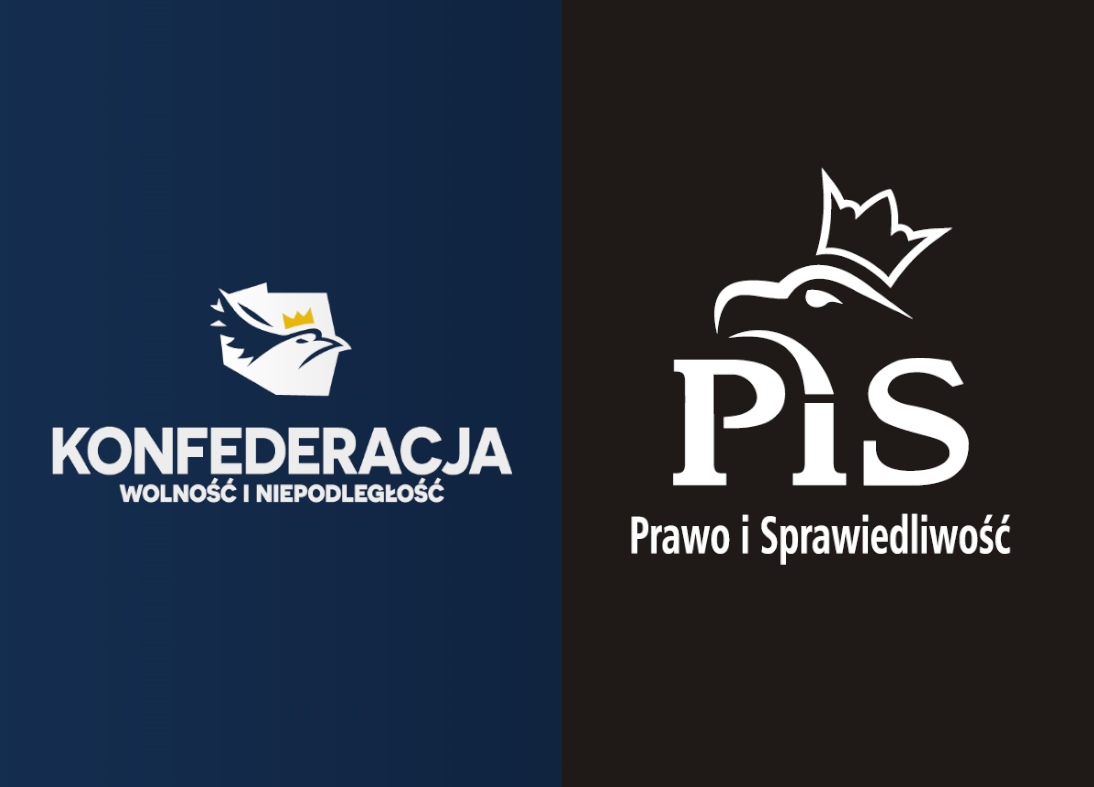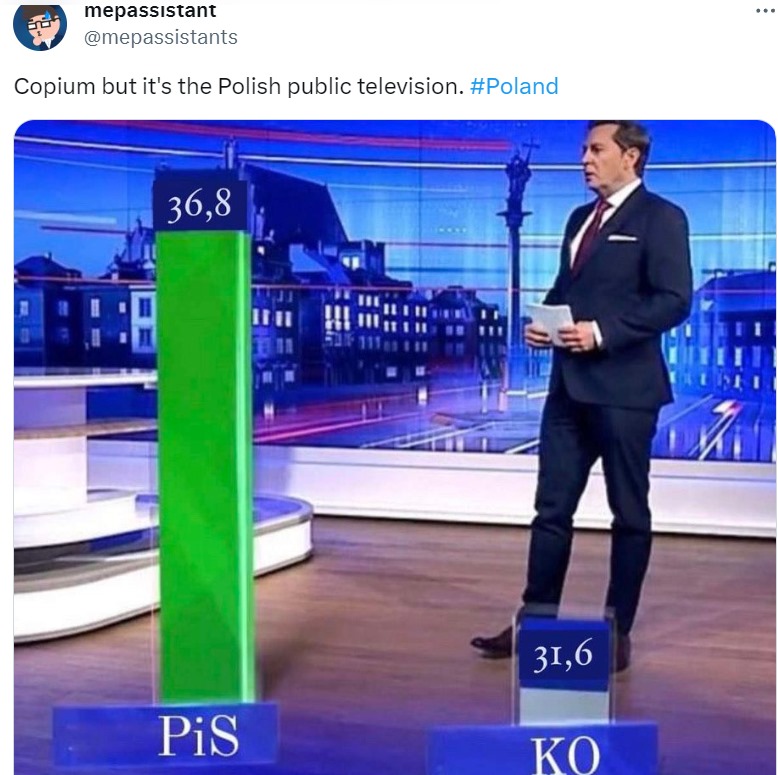By Evi Tsakali,
“***** *** i Konfe” you will see written in the streets of Warsaw. It means “Fuck PiS and Konfederacja” and it is written like that because of the police and censorship. Elections in such a tense context cannot leave you untouched when you are a resident of the country, even if you don’t have the right to vote; and especially given the implications for the European Union, that is true; times two.
When it comes to getting informed though, things can get very complicated when the only grasp of the language spoken in the country you currently reside is a bunch of animals that you learned on Duolingo. On the day of the elections, I tried following the result predictions during the day on international media (and the English/French speaking channels I could find on my college dorm TV), to little use though; the content was rather vague and constantly overshadowed by other current affairs that have concerned the international public opinion.
Thankfully, our Polish classmates came to the rescue and organized a lovely Polish Election Night on campus, which consisted of a very informative and expat-friendly presentation of the political landscape in Poland before watching the exit polls through a variety of sources, thus exploring also the media landscape of the country (special thanks to the people behind this initiative; Anna, Wojciech, Artur, Wera, Kuba, and Michał, the credits for the content of this article are to be given to you). Here’s what we learned and what I believe would provide non-Polish people with a simple yet essential understanding of the recent election.
An introduction to the political parties
First of all, we need to have an overview of the main actors in this election. I will begin with the until now governing party, known to everyone with even the slightest knowledge of European affairs especially related to human rights, democracy, and the Rule of Law, PiS (the Law and Justice Party). PiS is, as we already know, eurosceptic and right-wing, however -apparently- it is not the worst they have, despite what we may assume. What was interesting is that -according to the clarifications of our Polish colleagues- PiS may be conservative on social matters, but progressive when it comes to the economy (it was the first to introduce social benefits). The aforementioned is one of the (otherwise many) reasons that a potential coalition between PiS and the Konfederacja would not work out. Konfederacja is THE ultra-right-wing political party in the Polish political landscape; it is not only eurosceptic, anti-abortion, and anti-LGBTQ+ but also openly antisemitic and pro-monarchist. Contrary to PiS, it is conservative even on financial matters (especially when it comes to granting social benefits to migrants and refugees).

Gradually shifting to the more progressive spectrum, we have Koalicja Obywatelska (centrist “from a Polish perspective, but centre-right from a European perspective”) which you probably know as the party of Donald Tusk, the former president of the European Council. The party is definitely pro-European, and pro-abortion (at least on paper, from what we have been told; their clear stance is yet to be confirmed). Nevertheless, their rhetoric has been mainly revolving around being anti-PiS. More specific on being pro-abortion stands the also pro-European, centrist 3 Droga (3rd Wave), albeit remaining vague on the issue of the State-Church separation (especially given that its leader had received training to become a priest in the past).

Finally, heading towards the left, we have Nowa Lewica (New Left), a green, pro-European, and by far the most LGBTQ+ friendly party in Poland, that also got the first openly gay MP in the country elected (here in the College of Europe we have had the immense honor to have had classes taught by Marek Belka, former Prime Minister of Poland, former Director of the European Department of the IMF, among other positions of national, European and international caliber, who was affiliated to this party). In the previous elections, this party had participated as a coalition, and thus needed a minimum of 8%; they got 7.8%, which explains how PiS became so powerful. This time, they participated as a party, so they only needed 5%.
Polish media 101
Even briefly switching from one Polish television channel to another (and with some precious translation from our colleagues) could easily give us an impression of who is backing who. TVN, an American, Warner Bros-owned private channel, is clearly pro-Tusk, while the TVP (the Polish state TV) is obviously pro-PiS, to the point that their post-exit-polls headlines stated that PiS was winning. Actually, they took advantage of a misconception that has been poorly communicated in the international media as well. PiS did come first, but what it did not manage was to get enough seats (the majority in the lower chamber) to stay in power; even if they somehow achieved to form a coalition with the Konfederacja, the seats would not be enough.

What was not very discussed about on international media outlets and hence did not become very known to the international audience was that -besides the elections- there was also a referendum taking place the very same day; it consisted of extremely leading questions, essentially depriving voters of actual free choice:
-Question 1: Do you support selling off state assets to foreign entities, leading to the loss of control of Poles over strategic sectors of the economy?
-Question 2: Do you support raising the retirement age, including restoring the increased retirement age for men and women to 67?
-Question 3: Do you support the removal of the barrier on the border between the Republic of Poland and the Republic of Belarus?
-Question 4: Do you support the admission of thousands of illegal immigrants from the Middle East and Africa, in accordance with the forced relocation mechanism imposed by the European bureaucracy?
Many citizens decided to boycott the referendum and not request the voting card, which was proven fruitful because with under 50% of participation, the referendum was deemed invalid.
An introduction to the Polish political system instead of a conclusion
The legislative elections’ result will lead to a cohabitation, since the PiS-originating President -Andrzej Duda- is to stay in office for another couple of years. In Poland, the President is quite powerful; not as much as in France for example, but the President does dispose of the presidential veto (the law that is vetoed is sent back to the Parliament, where it needs a majority of 60%, which is hard to attain, in order to pass). Will Duda veto all the time? That will depend (taking into consideration that after his two consecutive terms in office, he cannot be reelected) on what he wants to do next, and on how he wants to be remembered…




